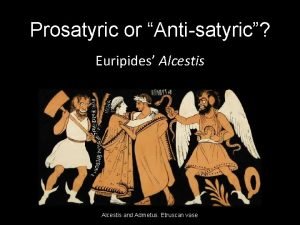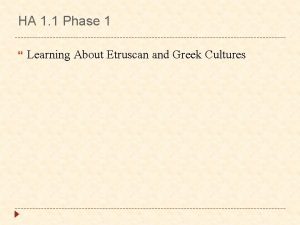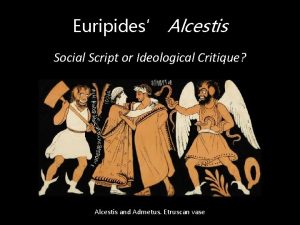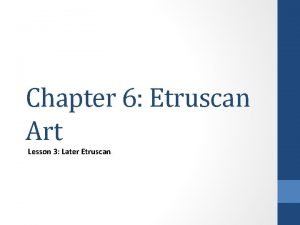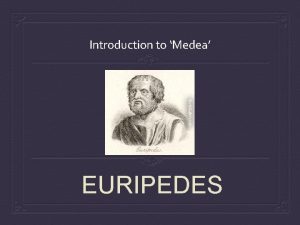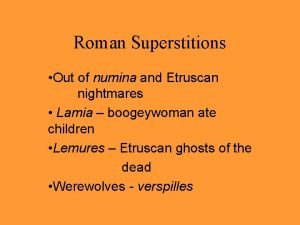Prosatyric or Antisatyric Euripides Alcestis and Admetus Etruscan












- Slides: 12

Prosatyric or “Anti-satyric”? Euripides’ Alcestis and Admetus. Etruscan vase

“She never can be hurt again. For her a thousand cares are over — she is sublime. But I, who have no title to be living and I have overstepped my mark, must go on and on — most melancholy — alive. Too late I learn this now. ” (Admetus to Chorus, Euripides Alcestis, p. 36)

Agenda • Tragedy in Performance • Reunion Scene • (p. 40 ff. , near bottom: HERACLES “You’ve lost a perfect wife, there’s no denying”) Discussion: Alcestis and Genre • What Is Alcestis? What Do We Learn? • Introduction to Play • Tragic Themes, Satyric Treatment?

Tragedy in Performance Reunion Scene (p. 40 ff. , near bottom: HERACLES “You’ve lost a perfect wife, there’s no denying”)

Discussion: Alcestis and Genre What Is Alcestis? What Do We Learn?

Ancient Commentary “The drama is rather of the satyr-play variety, because its reversal leads to joy and pleasure, contrary to tragic genre. Inadmissible as examples of tragic poetry are both the Orestes [of Euripides] and the Alcestis, as they start from misfortune and finish joyously, with the characters well off – a plot pattern holding rather more to comedy. ”

Discussion: Possible Points… • Happy tragedy? • Is that a happy ending? • Is happy tragedy even possible? • Genre parody? • Paratragic • And if Alcestis… • is/isn’t tragedy … what is tragedy?

Introduction to Play Tragic Themes, Satyric Treatment?

Production Facts Euripides Alcestis • • • 480 s-406 BCE First competes, 455 438 BCE 1 st preserved play 2 nd to Sophocles Tetralogy • Cretan Women • Alcmaeon in Psophis • Telephus • Alcestis

Mythological Background • • Asclepius, Apollo, Admetus Alcestis, Pelias, Medea Heracles & Cerberus Pelias takes a bath. . .

Alcestis: Analysis • Prologue (p. 1 ff. , Signet ed. ) • Parodos (6) • Apollo, death. (Quasi-agōn) • Elders of Pherae. (Alcestis: best of women) • Episode 1 (8) • Stasimon 1 (11) • Episode 2 (12) • • Maidservant, Leader • “Gods: “help!” • • • lyric duet, dialogue: Alcestis, Admetus (grief, fidelity) lyric duet: Admetus, Eumelus spoken: Admetus solo • best of women. . . Stasimon 2 (19) • Episode 3 (20) • Stasimon 3 (23) • Episode 4 (25) • • Short choral interlude (29) Episode 5 (29) • Stasimon 4 (37) • Exodos • Heracles, leader, Admetus. (Lodging, deception, desis-lusis) • Admetus’ hospitality • Admetus, Leader, Pheres. (Agōn) • Butler, Heracles. (Carousing, 1 st recognition) • Power of fate • Admetus, Heracles, silent Alcestis (2 nd recognition, 2 nd desis/lusis)

Themes: Gender, Heroism Alcestis Compare • • Achilles as “Best of the Greeks” (Homer Iliad 2. 411) • Achilles’ “undying glory” (Homer Iliad 9. 411) • Pericles to Athenian women • “Great will be your glory in not • • “Alcestis / who seems to me and all of us / best of wives a man could get” (Chorus, 7) “The noblest consort under the sun!” (Leader, p. 9) “Your death bequeaths | A theme for songs | For us, and lays for endless singers” (Chorus, p. 19) falling short of your natural character; and greatest will be hers who is least talked of among the men whether for good or for bad” (Thucydides 2. 45)
